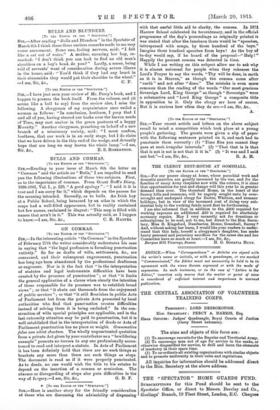ON COMMAS.
/To THE Forme or THE Sracostos."1 Sun,—In the interesting article "On Commas" in the Spectator of February 27th the writer considerably understates his case in saying that " the legal profession is forsaking punctuation entirely." So far as drafts of wills, settlements, &c., are concerned, and their subsequent engrossment, punctuation has long ago been abandoned by the professional draftsman or engrosser. Nor is it the fact that "in the interpretation of statutes and legal instruments difficulties have been created by the presence of punctuation"; or that "it limits the general application of a Gauge when clearly the intention of those responsible for its presence was to establish broad views" ; or that "it shuts out thousands from the enjoyment of public services "; or that "it still flourishes in public Acts of Parliament but from the private Acts promoted by local authorities who find that punctuation creates difficulties instead of solving them it is being excluded." In the con- struction of wills special principles are applicable, and in the last extremity attention may be paid to punctuation, but it is well established that in the interpretation of deeds or Acts of Parliament punctuation has no place or weight. Grammatica idea non viliat chartam. The wholly unpunetuated quotation from a private Act given by your contributor as a " bewildering example" presents no terrors to any one professionally accus- tomed to read and interpret a statute. In Acts of Parliament it has been definitely held that there are no such things as brackets any more than there are such things as stops. The document is read as if it were properly punctuated. As to deeds, no one would wish the title to his estates to depend on the insertion of a comma or semicolon. The absence or disregarding of stops also puts difficulties in the way of ftygery.—I am, Sir, &c., G. B. F.






































 Previous page
Previous page